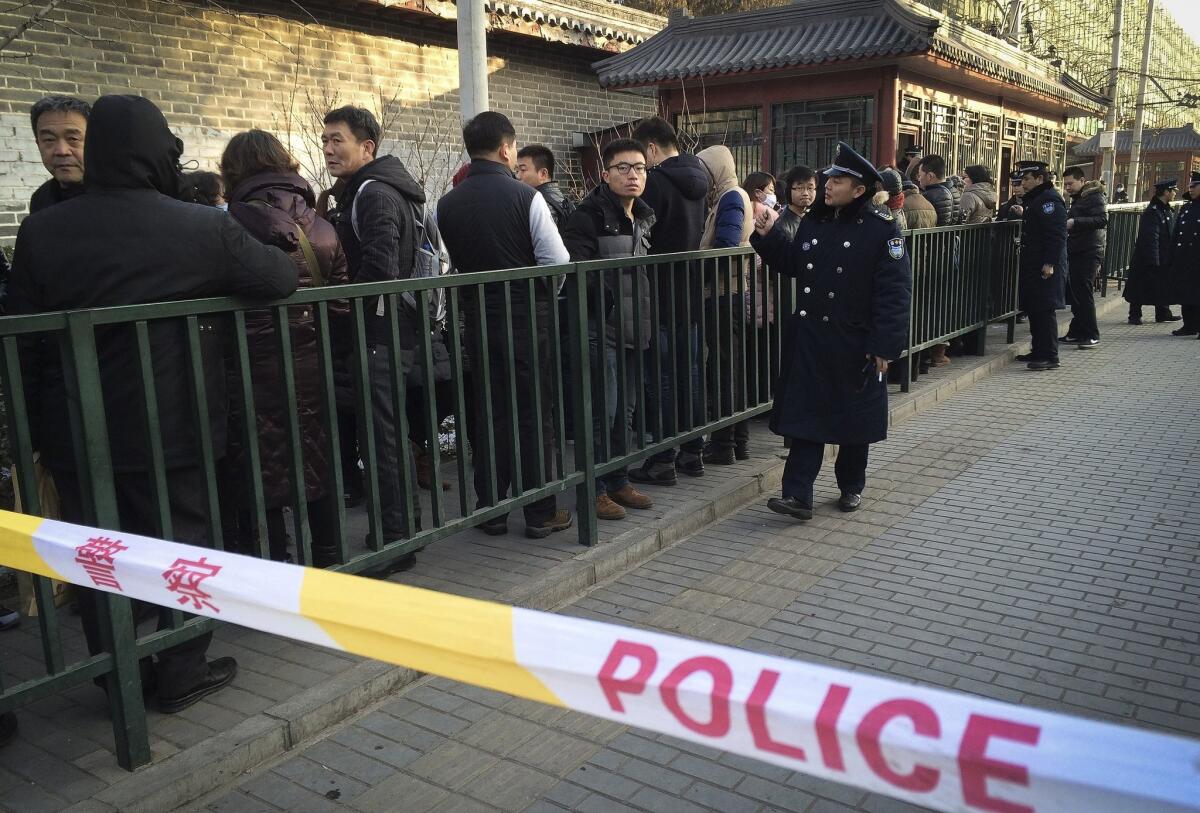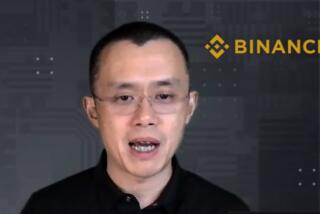Chinese company lived the high life -- until it all came crashing down
- Share via
Reporting from Beijing — When Chen Xue landed a job as a sales team manager at a high-flying Internet startup in May, she thought she was getting in on the ground floor of China’s next e-commerce boom.
And so it seemed. The company, an online lender named eZubao, was going gangbusters, adding tens of thousands of customers a week thanks to promises of high-yield investments — between 9% and 14.6%.
“I saw eZubao’s advertisements on [state-run] CCTV at prime time, so I thought it was a big and competitive company,” said Chen, 33, who was so impressed that she sank the equivalent of about $31,000 into eZubao’s financial products. Most of the money came from her husband’s parents.
Then, disaster struck. In December, eZubao abruptly shut its doors after 18 months in business. Police started investigating. Customers began protesting. This week, authorities broadcast interviews with eZubao’s detained founder and CEO confessing (perhaps under duress) that the entire operation was a Ponzi scheme. The state-run New China News Agency said the company had cheated 900,000 clients out of $7.6 billion, possibly the largest financial fraud in Chinese history.

Police urge eZubao depositors to follow procedures as they line up outside the State Bureau for Petition on Dec. 28, 2015, to file complaints in Beijing.
In the last decade, China has seen an explosion of shadow banking, with financial firms like eZubao performing bank-like functions but operating with much less oversight. On the upside, that’s given millions of lower-income individuals and small businesses unprecedented access to credit as well as new ways to invest their savings, no matter how modest their nest eggs may be.
But analysts have been warning for years that the lack of regulation and transparency in the sector could be a ticking time bomb.
Just how severe the problem might be, though, is a matter of contention, since experts can’t even agree on how big China’s shadow banking sector is. A report last year by the Brookings Institution, a Washington-based think tank, said estimates range from $769 billion to $7 trillion.
Brookings researchers concluded that the industry is still small enough that it presents a “relatively low risk” of triggering a financial crisis similar to that experienced by the U.S. in 2008, and that China has relatively large reserves to deal with any minor meltdowns.
Still, they warned that “if that optimistic view is wrong, it is likely to be because the lack of clarity about shadow banking has hidden larger problems.”
Some of the biggest of those problems are with peer-to-peer lending – the business that eZubao was in. Such companies serve as matchmakers between borrowers and investors. Last year, some 800 P2P lenders in China shut down — three times as many in 2014, the New China agency said. The biggest to fail was eZubao.
How authorities respond to the eZubao meltdown will be a test: Chinese officials promised this week that clients could soon register their grievances on the Ministry of Public Security’s website. But police have also detained protesters to discourage demonstrations, and propaganda officials have deployed censors to contain online complaints and promote the official line on the case.
Despite salacious disclosures from eZubao’s high-school dropout founder and luxury brand-loving CEO — including that they purchased a $20-million villa in Singapore and bought out the entire inventory of a Louis Vuitton store — public wrath has shifted rapidly toward the government.
“After seeing eZubao closed, I don’t believe in the Chinese government anymore; I don’t believe in this country anymore,” said Chen. “My passion and love towards this country is all gone.”
Chen is facing a quadruple whammy: She’s out of work, her in-laws have lost their life savings, her former clients are badgering her for their money back, and she’s having trouble finding a new job.
“Once a company hears that I used to be an eZubao employee, they reject me right away,” said Chen, who lives in Inner Mongolia and has a 3-year-old son. “My life has become such a mess. I’m under so much pressure now.”
In many ways, eZubao’s founder, Ding Ning, seemed to be living the “China dream.” The 34-year-old from impoverished Anhui province began working with his family’s metal buckle business at age 17, and later branched out into manufacturing can openers and screws.
In 2012, with China in the midst of a tech boom, Ding — despite no experience in banking or finance — set up a new company, Anhui Yucheng Financial Leasing. Two years later, apparently with help from a cousin in Australia, Ding launched eZubao’s commercial operations.
Ding found attractive women to staff the executive ranks; former staff have come forward in recent days to say Ding recruited them through a high-end matchmaking service called Enzo.
Chief executive Zhang Min told investigators Ding asked many of his female employees to wear luxury brands such as Gucci and Chanel to appear “professional.” Authorities say Zhang herself was given an expensive diamond ring, pricey watches, luxury cars, $84 million in cash and the mansion in Singapore.
Zhang became one of the prominent faces of the company. In one TV commercial — filmed in eZubao’s now-abandoned offices on the 27th floor of a Beijing skyscraper, she glides confidently through the tastefully appointed suite. “eZubao. Enjoy your life easily. Collect success in your hands. eZubao, Yucheng Group,” the script murmurs.
The company bought prime-time slots on state-run TV and plastered its ads on bullet trains and airlines. It touted its certification as a “Credible Model Company of Chinese Internet” in 2014, although the designation came from a dubious outfit that collects money for its certificates.
In late November, eZubao’s parent company, Yucheng, was honored as one of the “Most Responsible Enterprises of 2015” — alongside major brands including Samsung, Porsche and Amway — at an event called the 11th Corporate Social Responsibility International Summit.
Such publicity, said Kang Ting, a 27-year-old from Hohhot, Inner Mongolia, created a strong impression that eZubao was legit — and well-connected.
“Because of eZubao’s advertisements on CCTV, we never questioned its credibility,” said Kang, who until last summer had worked as a stock and futures trader in Hohhot. She had $4,600 of her savings in eZubao when it shut down.
Kamel Mellahi, a China specialist at Warwick Business School in England, said P2P platforms have surged in popularity in China because “banks in China still do not provide enough credit to small and medium business – they favor large state companies.” China’s P2P business remains “in its infancy,” he added, and “fraudulent platforms such as eZubao are expected to surface.”
Join the conversation on Facebook >>
Nevertheless, “perhaps what is unique in this case is the suggestion that investors trusted eZubao because it used reliable state-backed channels such as high-speed-trains and CCTV to market itself, which consumers mistakenly took it as an indicator that it had the government backing,” he said.
Many customers of China’s P2P lending platforms are relatively poor and inexperienced with financial institutions. In a case study on one major P2P lender published this fall, the Assn. of Chartered Certified Accountants, a global body of professional accountants, found that 56% of customers had never borrowed from banks or other institutions, the majority had only a high school degree, and 52% of borrowers had income between $310 and $770 a month.
Between the end of 2011 and 2014, the number of online P2P lenders in China jumped from 50 to more than 1,500. Only in July did China introduce what the accountants group called “relatively light regulatory measures” aimed at offering greater protections for borrowers and lenders.
Those guidelines, however, were not immediately implemented. In late December, after eZubao shut down and protesters hit the streets, Chinese authorities issued a draft plan to impose greater restrictions on P2P platforms, including prohibiting them from accepting deposits or providing any guarantees for lenders.
For eZubao investors like Kang, those regulations may be too little, too late. So far, she has no idea whether she’ll see any of her funds returned.
Investigators say that they’re sorting through records now—and claim they had to use backhoes and other equipment to unearth thousands of documents that eZubao executives buried 20 feet underground, on the outskirts of Hefei, in Anhui province.
“For a long time, it was rumored that we would all get our money back,” said Kang, who’s unemployed. “But we have not heard anything positive since then.”
Nicole Liu and Yingzhi Yang in the Times Beijing bureau, and special correspondent Chuan Xu, contributed to this report.
Follow @JulieMakLAT for news from China
ALSO
In China, rise of Salafism fosters suspicion and division among Muslims
Looking for another sign of a weakened China economy? Try the rent-a-foreigner market
Beijing says U.S. warship ‘sabotaged the peace’ by sailing near island in South China Sea
More to Read
Sign up for Essential California
The most important California stories and recommendations in your inbox every morning.
You may occasionally receive promotional content from the Los Angeles Times.











